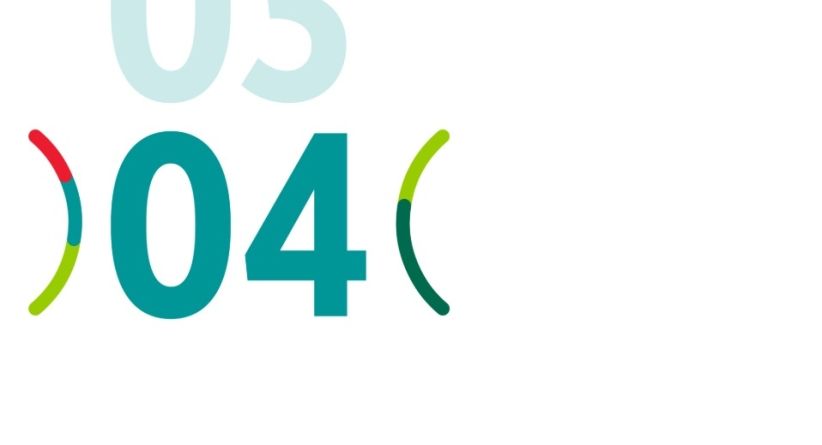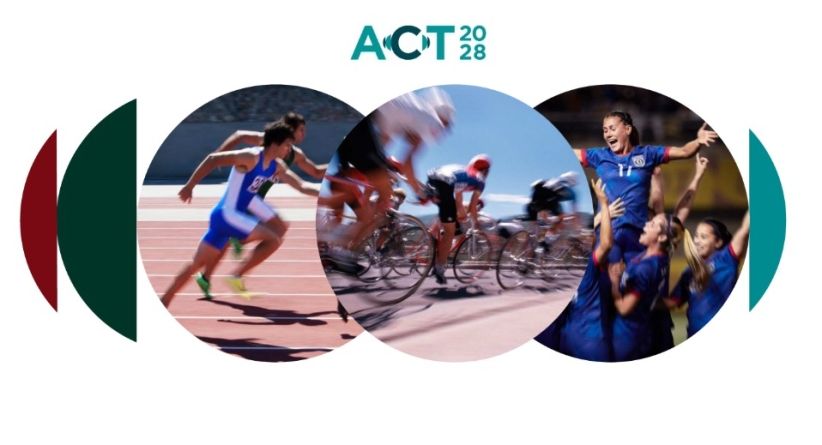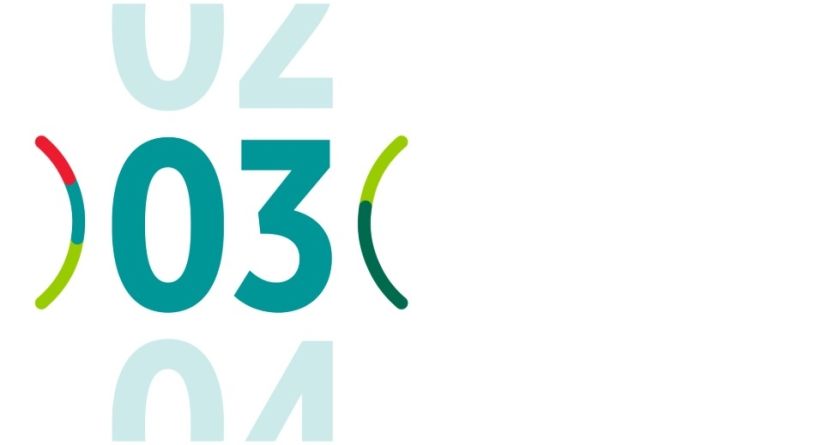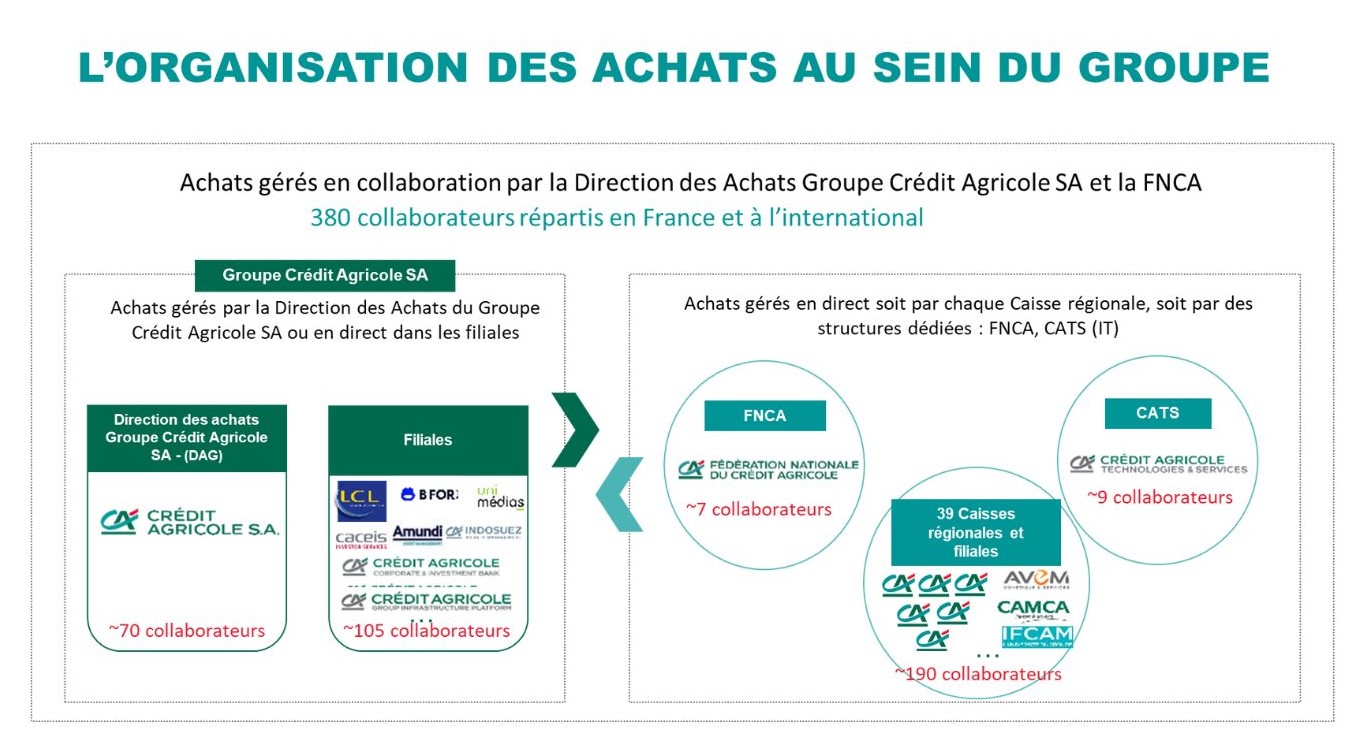
You are a supplier or would like to become a supplier
Our Group's expertise lies in retail banking and specialized businesses such as corporate and investment banking, insurance, asset management or specialized financial services (consumer credit, leasing and factoring, etc.).
All these business lines, subsidiaries and purchasing areas are governed by a common purchasing strategy and guidelines for the entire Group, implemented by Crédit Agricole S.A. Group Purchasing Department.
Our organization
Key figures
-
+ 50 000suppliers
-
10billion euros/year in external expenditure
-
380employees in the Purchasing business line
-
Supplier path
How to become a supplier?
The Crédit Agricole S.A. Group Purchasing Department manages supplier relations. Suppliers are selected following a purchasing process that includes the following stages:
Sourcing: see the "Contact us" section if you are not already in contact with the Crédit Agricole Group Purchasing Department.Invitation to tender or open market award
- Decision
- Contractualization
- Invoicing
- Monitoring supplier relations
The stages in the purchasing process are:
- Sourcing
A market analysis is carried out to identify the suppliers or technologies likely to be able to meet a requirement.
- Invitation to tender or open market award
The response is assessed in terms of the quality and relevance of the proposed solution.
Any company responding to a Group tender:- is assessed on the quality of its technical and financial offer
- is assessed in terms of its financial health and economic dependence
- undergoes a CSR assessment
- provides and undertakes to provide its legal documents throughout the contractual relationship.
- Decision
The decision to select a company is taken collectively by a joint committee made up of buyers and specifiers.
Generally speaking, the criteria taken into account are the quality of the proposed solution, the total cost, the company's financial evaluation, the completeness of its legal file and its CSR evaluation, etc.
- Contractualization
Depending on the area of purchasing, specific clauses may be drafted in line with the Group's values and objectives (use of the sheltered employment sector, environment, consideration of TCO, etc.).
The contract signed and the volume of business entrusted will be shared throughout the Group.
- Invoicing
Supplier payment terms is a major issue that concerns all Crédit Agricole Group entities. Paying suppliers on time is the basis for a healthy and balanced relationship. To facilitate invoice processing and reduce payment terms, suppliers must send us their invoices via our EASY platform (procurement information system).
- Monitoring supplier relations
Crédit Agricole's Purchasing teams manages and co-ordinates all supplier relations by fostering a customer-supplier relationship based on mutual respect and responsibility, in particular through regular meetings. Throughout the contract, all indicators are monitored (quality, financial, CSR, economic dependence, etc.) and shared with the entire Group.
-
Responsible purchasing
To help boost the Group's performance while creating value for its businesses, while respecting our values and our environment, the Group has defined a genuine Responsible Purchasing Policy.
Charter
Crédit Agricole S.A. signed the Responsible Supplier Relations and Purchasing Charter in 2011 and has renewed its commitment by signing this updated charter in November 2021. The charter comprises ten commitments to responsible purchasing and a fair and sustainable relationship between major clients, SMEs and suppliers. It covers issues such as environmental impact, financial fairness and reducing the risk of mutual dependency.
This charter is part of the Ethics policy implemented by the Crédit Agricole Group.Supplier Relations and Responsible Purchasing Label
Crédit Agricole S.A. Group celebrated the 10th anniversary of its “Responsible Purchasing and Supplier Relations Label” award. The only distinction awarded and recognised by the public authorities, this label distinguishes companies that maintain sustainable and balanced relations with their suppliers. For the 10th consecutive year, the label was awarded after presentation of the teams’ achievements and results to an independent auditor, and by decision of the Procurement Committee on 30 April 2024. The organisation and actions of Crédit Agricole S.A. and its subsidiaries have been certified at a “probative” level compared to the ISO 20400 standard.
CSR Assessment
Adopt an environmentally, socially and ethically responsible approach
Taking into account the CSR maturity of suppliers: this assessment is entrusted to an independent third party and takes into account international ESG standards.
Questions specific to the products and services purchased are included in the specifications in connection with the identification of the main issues in our CSR risk mapping by purchasing category.
The main issues of responsibility stem directly from the seven questions of ISO 26000: human rights, working conditions, the environment, fair practices, etc.
For example, questions are systematically asked about the professional equality index, the employment rate of persons with disabilities and the carbon footprint of the supplier.
At a minimum, suppliers must subscribe to the requirements of our “Responsible Purchasing” Charter with reciprocal customer/supplier commitments.
In the calls for tender, the CSR criteria for selecting a supplier will represent at least 15% to 20% of the overall score.
Inclusive Purchasing
Crédit Agricole S.A. is committed to the employment and integration of people with disabilities within the framework of its Group Disability Agreement. The use of the adapted and protected sector is one of these commitments promoting a responsible and citizen-orientated purchasing method.
Decarbonisation of purchases
In 2022, the Crédit Agricole Group launched a purchasing decarbonisation project that is fully in line with the Crédit Agricole Group’s societal project and contributes to the objective of “Acting for the climate and the transition to a low-carbon economy”.
The Group Purchasing Department has defined a trajectory target for the Crédit Agricole S.A. Group, which is deposited with the SBTi. This objective is built according to the SBTi requirements specific to financial institutions for categories 1-14 of scope 3 (footprint excluding financing). As such, Crédit Agricole S.A. Group is committed to achieving 40% of its external spending with suppliers that have set science-based reduction targets by 2027.
Ethics
The ethics and professional alert system is accessible to the Group's service providers and suppliers. It makes it possible to report any breaches of the applicable regulations or internal rules and procedures, in particular those relating to the code of conduct, in accordance with the Sapin II law of 9 December 2016 and the duty of vigilance of 27 March 2017.
The whistleblowing system can be accessed via the internet at any time and any place from the following link: here
The platform makes it possible to explain the facts and to discuss with the people in charge of handling the alert via a protected dialogue box, while protecting the identity of the author of the alert, who can choose to remain anonymous.
Reports are handled by independent experts, confidentially and in accordance with the regulations in force.Whistleblowers are protected against the risk of reprisals. Misuse of the system may result in sanctions or prosecution.
-
The Mediator
In the event of a dispute, the supplier or the company may refer the matter to the internal mediator.
As part of its Responsible Supplier Relations Charter and, more broadly, its Responsible Purchasing policy, the Crédit Agricole S.A. Group undertakes to behave fairly and ethically towards its suppliers. One of the charter's commitments is the appointment of an internal mediator to resolve any disputes.
Éric Campos, Head of Corporate Social Responsibility and member of Crédit Agricole S.A.'s Executive Committee, acts as Internal Mediator for all Crédit Agricole Group entities in France and abroad.
How do I contact the Internal Ombudsman? Simply send an e-mail to: mediateur.fournisseur@credit-agricole-sa.fr
-
Submitting an invoice
How do I submit an invoice?
It couldn't be simpler, thanks to our dedicated procurement information system called EASY. You can deposit your invoices and receive their payment according to the conditions set out in the contract (deposit your invoices and receive their payment according to the conditions set out in the contract.)
- Log on to EASY
- Submit your invoice by associating it with your order number
- Receive your payment according to the terms of the contract
If you do not have access to our Easy purchasing information system, please contact the person who initiated the order.







